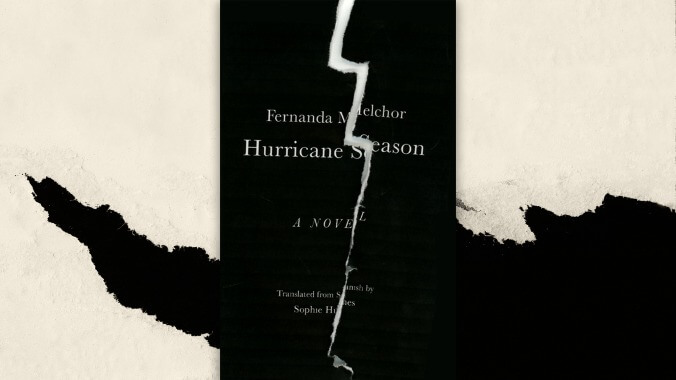Hurricane Season lets loose a tempest of superstition and violence in small-town Mexico
Image: Graphic: Allison Corr
It begins with the most tired of clichés: the body of a dead woman. Five children make the discovery near a river one hot afternoon, smelling the corpse before they see its “dark mask seething under a myriad of black snakes.” But the associations the trope stirs up—a serial killer on the loose, an obsessive detective pinning photographs to a cork board—are not just absent from Hurricane Season; it’s as if they never existed in the first place. In her Booker-nominated novel, Mexican writer Fernanda Melchor conjures a tempestuous story that obliterates long-familiar portrayals of violence. In their place she sets spinning a whirling dervish of misogyny, homophobia, and superstition amid the mundane lives of the poor.
The body was once the Witch, something of a soothsayer, drug dealer, and health care provider to the people of La Matosa, a poverty-stricken village in “the ass end of nowhere.” The area’s low-wage jobs include hacking through sugar cane fields with machetes, driving trucks to and from northern oil fields, and a secondary economy of sex work. “[P]lenty of them didn’t own so much as the towels they used to wipe away the bodily fluids of the men who screwed them,” Melchor writes, with typical frankness.
Through a roaming, often very close third-person perspective, Melchor details the days leading up to the Witch’s death. Action is first relayed from one character’s tilted angle—a lifeless body glimpsed in a rearview mirror—before another gives their own slant. (It’s not quite Rashomon, but you get the picture.) Pieces of the central plot repeat, while each chapter, each long, tumbling sentence, fans out, sweeping up anything loose in its sway, like a landslide amassing debris as it surges downhill: A girl’s uncle skips out on his family to become a Norteño troubadour and is later jailed for murder; another man, apolitical but strapped for cash, gets paid to support a “prick” candidate for mayor.
Melchor has said her home state of Veracruz inspired the setting for Hurricane Season, her first book to be translated into English (by Sophie Hughes). In the fictional La Matosa, Catholic guilt mixes with indigenous folklore; the devil is a real person, and kids grow up hearing the supernatural tale of La Llorona. The Witch herself emerges as a fantastical being, a tall, shadowy figure dressed all in black, with large hands and a deep voice. There are whispers of a stash of gold coins inside her dilapidated mansion and a diamond ring “the size of a fist.” The women of the area treat the Witch with a commiserative, practical efficiency, trading earrings or tamales for the tonics and abortions they can’t afford. The men paint her as a cunning, sex-crazed sorceress, but can’t resist walking through her door.
There may be truth to the rumors of the Witch’s drug-fueled orgies, but her fuller humanity is eventually revealed, and with it Melchor shows how hearsay laced with fear can lead to milder but no less devastating violence than what fists or knives enact. Superstition isn’t just a dark, fanciful strain of storytelling, the author says. These men and boys use it to cut through their sexual shame, and in the process, they make the Witch into an avatar for their suspicion of both straight women and gay men. They are disgusted by what they want and the people who give it to them.
For all its heady lore, Hurricane Season also observes the fleeting gratifications of everyday life. These characters are antsy, sometimes traumatized people who find respite where they can: They get off, they get high on aguardiente or pills “guzzled like candy,” they drink consommé whose special sauce is “so damn tasty and full of curative properties” that it makes one hungover man “feel human again.”
The author doesn’t slow down to pick any of this apart. She lets it swirl in an intoxicating eddy of warm beer and cheesy pop songs, crooked cops and a cemetery so full its graves look like “pitcher’s mounds.” Wild yet intentional, unsentimental and sometimes funny, Melchor’s prose runs counter to a certain prevalent American aesthetic wherein every line is stripped to its bare essentials, a style that looks bloodless and labored by comparison. Recursion is the thing—both ideas returned to and the profane asides that jab each winding sentence; in the span of just a few pages, one character describes another as a “gutless prick,” “ungrateful little prick,” “shit-for-brains cousin,” “little dipshit,” “little chickenshit,” “little shit,” and “stupid prick.” It creates a stirring rhythm, at once vital and imbued with a nauseating inevitability. As subsequent chapters relate ever more desperate circumstances and sinister motivations, one sinks deeper and deeper into Melchor’s waking nightmare as into a pool of mud.
This is not, to put it lightly, a subtle work. Despite their specificity, the characters in Hurricane Season come second to the novel’s formidable cadence. It’s risky, too, to traffic in the kind of brutality Melchor does—rape, bestiality, even the tossed-off sexist assumptions men and women make about each other—but she wields it all expertly, and with the brio of a drunken dancer. What remains by novel’s end is the sense of a writer going for it, of breathlessly recounting an unsettling story, one with the terrible power of a myth.